Africa
Peace talks between DRC and M23 rebels ‘moving in the right direction’
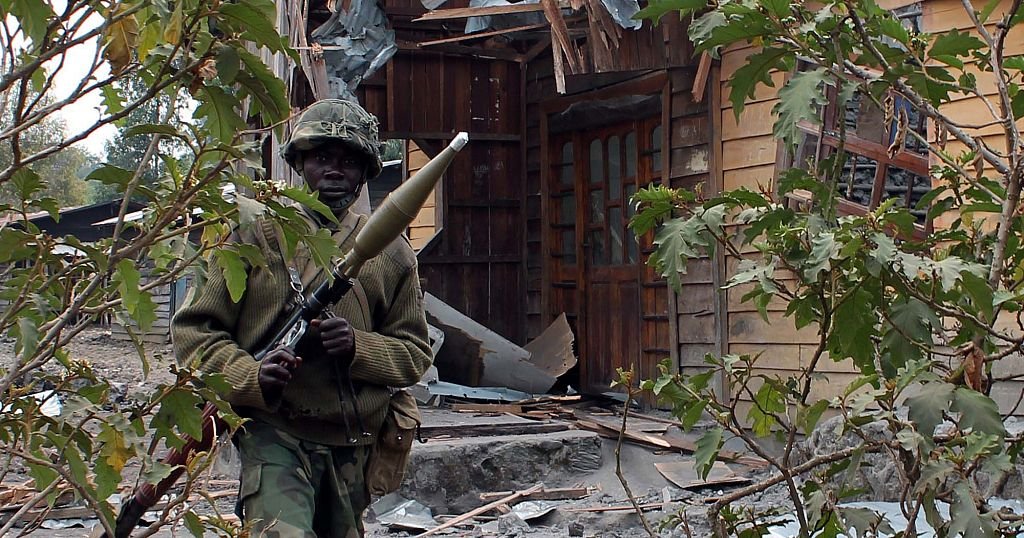
Talks between the Democratic Republic of the Congo (DRC) and the Rwandan-backed M23 rebel group are ‘moving in the right direction’, a diplomatic source told AFP as negotiations continue between the two parties in Qatar.
Congolese and M23 negotiators are currently working with Qatari mediators to try to overcome the remaining obstacles, the same diplomatic source told AFP, speaking on condition of anonymity.
Last week, the M23 had called for the resumption of talks to resolve the outstanding issues in the peace deal facilitated by the US and signed in Washington last month between Kinshasa and Kigali.
The treaty is aimed at putting an end to the fighting that has claimed thousands of lives in eastern Congo. But unless M23, the most prominent armed group fighting in the region, agrees to it, the conflict is unlikely to end.
Many Congolese see the pact as an opportunity for the US to acquire minerals needed for much of the world’s technology after their government reached out to Washington for support in fighting the rebels. President Trump has pushed to gain access to such minerals at a time when the United States and China are actively competing for influence in Africa.
Long road ahead
The peace deal is not likely to end the conflict quickly
The Rwanda-backed M23 rebel group is the most prominent armed group in the conflict, and its major advance early this year left bodies on the streets. With 7 million people displaced in Congo, the United Nations has called it “one of the most protracted, complex, serious humanitarian crises on Earth.”
Congo hopes Washington will provide it with the security support needed to fight the rebels and possibly get them to withdraw from the key cities of Goma and Bukavu, and from the entire region where Rwanda is estimated to have up to 4,000 troops. Rwanda has said that it’s defending its territorial interests and not supporting M23.
M23 rebels have suggested that the agreement won’t be binding for them. The rebel group hasn’t been directly involved in the planned peace deal, although it has been part of other ongoing peace talks.
Corneille Nangaa, leader of Congo River Alliance — known by its French acronym AFC — which includes M23, told the Associated Press in March that direct peace talks with Congo can only be held if the country acknowledges their grievances and that “anything regarding us which are done without us, it’s against us.”
An M23 spokesperson, Oscar Balinda, echoed that to the AP this week.
Nduhungirehe pointed to separate talks happening in Qatar that are meant to get both Congo and the M23 rebels to agree among themselves how they will end the fighting. He also said Rwanda agreed to lift its “defensive measures.” It was not clear if he meant withdrawing the troops that Rwanda has said are defending its territorial interests.
Rwanda also has been accused of exploiting eastern Congo’s minerals, used in smartphones, advanced fighter jets and much more. Rwanda has denied any involvement, while analysts say that might make it difficult for Rwanda not to be involved in the region.
The deal is at the heart of the American government’s push to counter China in Africa. For many years, Chinese companies have been a key player in Congo’s minerals sector. Chinese cobalt refineries, which account for a majority of the global supply, rely heavily on Congo.
What the US role looks like in ending the conflict
Congo’s foreign minister said the US has proven to be a “reliable partner” during the peace process and on other issues in relations between the two countries.
“So there is no doubt in this moment, if you want, when it comes to the credibility of the US as a partner, be it for a peace process, where we have signed a very important agreement today, or for investment from the US,” Wagner told the AP in an interview Friday evening.
Analysts say the US government’s commitment might depend on how much access it has to the minerals being discussed under separate negotiations between the American and Congolese governments.
The mostly untapped minerals are estimated to be worth as much as $24 trillion by the US Department of Commerce.
Christian Moleka, a political scientist at the Congolese think tank Dypol, called the deal a “major turning point” but said it could “in no way eliminate all the issues of the conflict.”
“The current draft agreement ignores war crimes and justice for victims by imposing a partnership between the victim and the aggressor,” he said. “This seems like a trigger-happy proposition and cannot establish lasting peace without justice and reparation.”
In Congo’s North Kivu province, the hardest hit by the fighting, some believe that the peace deal will help resolve the violence but warn justice must still be served for an enduring peace.
“I don’t think the Americans should be trusted 100%,” said Hope Muhinuka, an activist from the province. “It is up to us to capitalize on all we have now as an opportunity.”
Aftermath of Rwandan genocide
The conflict can be traced to the aftermath of the 1994 genocide in Rwanda, where Hutu militias killed between 500,000 and 1 million ethnic Tutsi, as well as moderate Hutus and Twa, Indigenous people. When Tutsi-led forces fought back, nearly 2 million Hutus crossed into Congo, fearing reprisals.
Rwandan authorities have accused the Hutus who fled of participating in the genocide and alleged that elements of the Congolese army protected them. They have argued that the militias formed by a small fraction of the Hutus are a threat to Rwanda’s Tutsi population.
Since then, the ongoing conflict in east Congo has killed 6 million people, in attacks, famines and unchecked disease outbreaks stemming from the fighting.
Africa
Ruto’s $9M mega church sparks outrage amid Kenya’s crisis
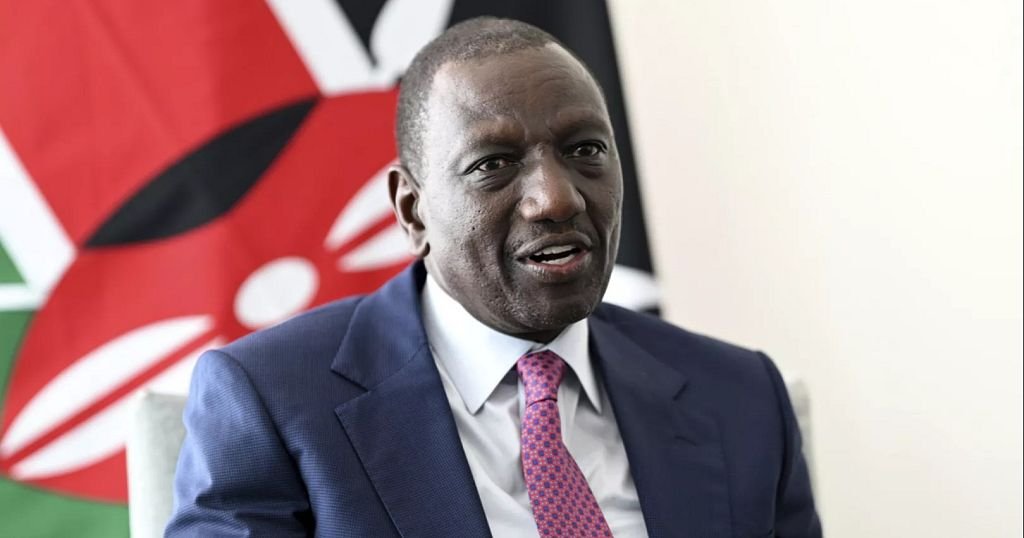
Amid Kenya’s worst wave of anti-government protests in years and mounting economic hardship, President William Ruto is pressing ahead with plans to build a lavish mega church at his official residence. This project has ignited debate over the intersection of faith, power, and public accountability.
The construction of the Church in central Nairobi is estimated to cost KES 1,2 billion ($9,3 million) and fit upwards of 8.000 people, according to local media reports.
The grandiose project was met with criticism from many Kenyans, who have struggled under the ongoing cost-of-living crisis.
Economic hardships in Kenya have taken a toll on the popularity of the sitting President. Tensions escalated on Monday, when 31 people were killed and more than 500 were arrested in widespread anti-government protests.
The placement of a worship site on government grounds has prompted a legal challenge. Kenya’s high court is set to hear a petition by lawyer, Levy Munyeri, who argued that the mega church violates provisions in Kenya’s constitution, which denounces any state religion.
The President has so far been unfazed by the criticisms, “I am not going to ask anyone for an apology for building a church. The devil might be angry and can do what he wants,” Ruto said on July 4th, noting that he would pay for the Church with his own money.
“Ruto knows when push comes to shove in politics and other arms of government, he will get his way. He knows parliament cannot stop him”, said Dr. Denis Galava, Kenyan political researcher and journalist.
In an interview with Africanews, Galava points to recent developments in Kenya’s parliament, which make Ruto’s grasp on power solid despite political unrest.
Earlier this year, key allies of opposition leader Raila Odinga, were appointed to senior positions in Ruto’s cabinet, weakening the counterbalance to the sitting President.
“You can’t talk about a political movement that can stop him from doing anything, because parliament is now a lapdog”, Galava said.
Ruto is Kenya’s first evangelical Christian president. The 58-year-old politician put religion at the centre-stage of his 2022 election campaign, earning him the nickname ‘deputy Jesus’.
He has previously built a chapel in the compound at his former residence in the Karen suburb of Nairobi.
Africa
“I can’t do nuttin’ for ya man”, Nigerian Minister quotes Flavour Flav in rejection of Trump policy
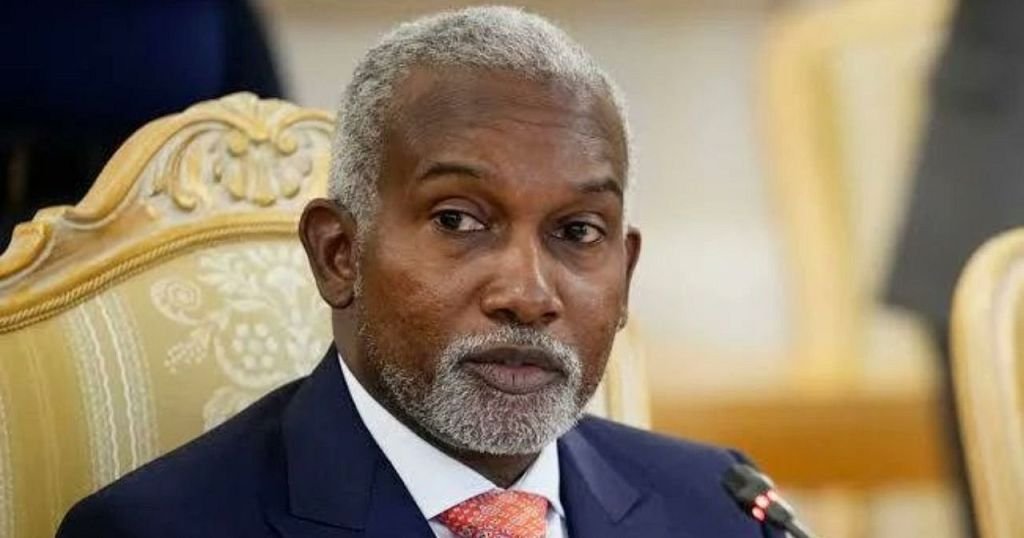
Nigeria won’t accept 300 Venezuelan deportees from the U.S, Foreign Minister Yusuf Maitama Tuggar said in a TV interview on Thursday, following reports that the White House was pushing African leaders to take in illegal immigrants from third-party countries.
In a surprise move, Tuggar started quoting U.S rapper Flavour Flav as a guest on Channels Television’s ‘Politics Today’ in response to news of Washington’s latest deportation policy,
“You’ll remember af line from Flavour Flav: Flavour Flav has problems of his own, I can’t do nuttin’ for ya man”, Tuggar said, referencing the rapper’s famous 1990 track.
The quote follows reports by The Wall Street Journal that five African leaders participating in a summit at the White House from July 9-11 had received letters pushing them to accept migrants deported by the U.S. whose home countries refuse to take them back.
The U.S had also asked Nigeria to take in deportees, Tuggar said, but he argued it would be ‘unfair’ given current issues in the country,
”We have enough problems of our own. We cannot accept Venezuelan deportees to Nigeria for crying out loud”.
Instead, the Foreign Minister said that Nigeria was open to doing business with the U.S emphasising critical minerals and gas trade as potential avenues for future cooperation,
”Nigeria is in a very good position to continue a symbiotic relationship with the U.S”, he said.
While Nigeria appears to reject U.S deportees for now, other countries are facing mounting pressure to comply with Trump’s new immigration policy.
On Monday, South Sudan accepted eight men, including nationals from Myanmar, Cuba, Vietnam, Laos, and Mexico all convicted of serious crimes like murder and sexual assault.
Previous removals have gone to El Salvador and Costa Rica, and talks are reportedly ongoing with countries like Rwanda, Benin, and Moldova.
Africa
UN warns millions will die by 2029 if new funding for HIV programs isn’t found
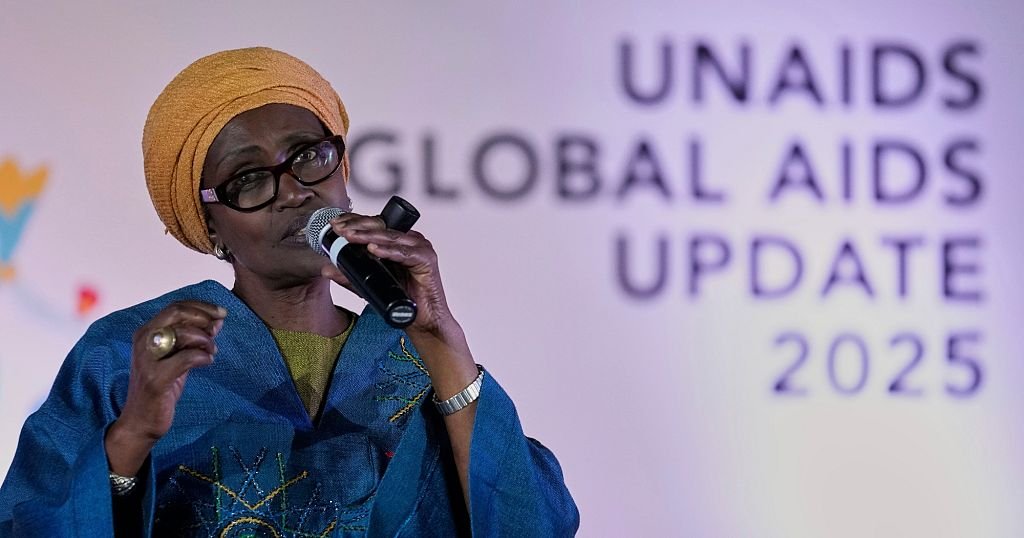
Years of American-led investment into AIDS programs have reduced the number of people killed by the disease to the lowest levels seen in more than three decades and provided life-saving medicines for some of the world’s most vulnerable.
But in the last six months, the sudden withdrawal of U.S. money has caused a “systemic shock,” U.N. officials warned, adding that if the funding isn’t replaced, it could lead to more than 4 million AIDS-related deaths and 6 million more HIV infections by 2029.
A new UNAIDS report released Thursday said the funding losses have “already destabilized supply chains, led to the closure of health facilities, left thousands of health clinics without staff, set back prevention programs, disrupted HIV testing efforts and forced many community organizations to reduce or halt their HIV activities.”
It also said that it feared other major donors scaled back their support, reversing decades of progress against AIDS worldwide — and that the strong multilateral cooperation is in jeopardy because of wars, geopolitical shifts and climate change.
A ‘lifeline’ removed
The $4 billion that the United States pledged for the global HIV response for 2025 disappeared virtually overnight in January, when U.S. President Donald Trump ordered that all foreign aid be suspended and later moved to close the USAID.
Andrew Hill, an HIV expert at the University of Liverpool who is not connected to the United Nations, said that while Trump is entitled to spend U.S. money as he sees fit, “any responsible government would have given advance warning so countries could plan,” instead of stranding patients in Africa where clinics were closed overnight.
The U.S. President’s Emergency Plan for AIDS Relief, or PEPFAR, was launched in 2003 by U.S. President George W. Bush, the biggest-ever commitment by any country focused on a single disease.
UNAIDS called the program a “lifeline” for countries with high HIV rates, and said that it supported testing for 84.1 million people, treatment for 20.6 million, among other initiatives. According to data from Nigeria, PEPFAR also funded 99.9% of the country’s budget for medicines taken to prevent HIV.
U.N. Assistant Secretary-General Angeli Achrekar, a UNAIDS deputy executive director who was PEPFAR’s principal deputy coordinator until January 2023, said the program is under review by the Trump administration though Secretary of State Marco Rubio issued a waiver “to continue life-saving treatment.”
““The extent to which it will continue in the future, we don’t know,” she told a video news conference with U.N. reporters in New York. “We are cautiously hopeful that PEPFAR will continue to support both prevention and treatment services.”
A gap impossible to fill
In 2024, there were about 630,000 AIDS-related deaths worldwide, per a UNAIDS estimate — the figure has remained about the same since 2022 after peaking at about 2 million deaths in 2004.
Even before the U.S. funding cuts, progress against curbing HIV was uneven. UNAIDS said that half of all new infections are in sub-Saharan Africa.
Tom Ellman of Doctors Without Borders said that while some poorer countries were now moving to fund more of their own HIV programs, it would be impossible to fill the gap left by the U.S.
“There’s nothing we can do that will protect these countries from the sudden, vicious withdrawal of support from the U.S.,” said Ellman, head of the group’s South Africa medical unit.
Experts also fear another significant loss — data.
The U.S. paid for most HIV surveillance in African countries, including hospital, patient and electronic records, all of which has now abruptly ceased, according to Dr. Chris Beyrer, director of the Global Health Institute at Duke University.
“Without reliable data about how HIV is spreading, it will be incredibly hard to stop it,” he said.
-
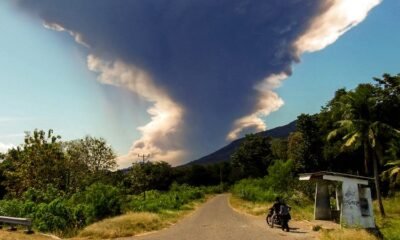
 Asia5 days ago
Asia5 days agoIndonesia’s Mount Lewotobi Laki Laki erupts sending ash 11 miles into sky
-
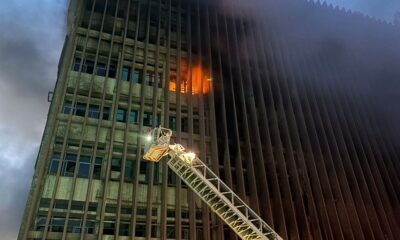
 Africa4 days ago
Africa4 days agoCairo telecom fire injures 14, disrupts internet nationwide
-

 Europe4 days ago
Europe4 days agoHe was born to a US citizen soldier on an army base in Germany. Now he’s been deported to Jamaica, a country he’d never been to
-
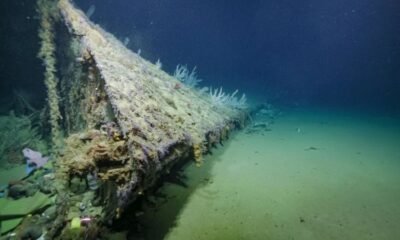
 Asia3 days ago
Asia3 days agoA torpedoed US Navy ship escaped the Pacific in reverse, using coconut logs. Its sunken bow has just been found
-

 Europe2 days ago
Europe2 days agoTrump promised 200 deals by now. He’s gotten 3, and 1 more is getting very close
-
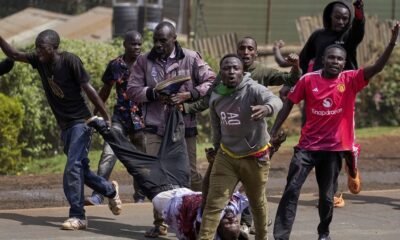
 Africa4 days ago
Africa4 days agoKenya: at least 10 dead in ongoing protests, 29 injured nationwide
-

 Lifestyle3 days ago
Lifestyle3 days agoArmani couture channels black as maestro misses Paris bow for 1st time, days from 91st birthday
-
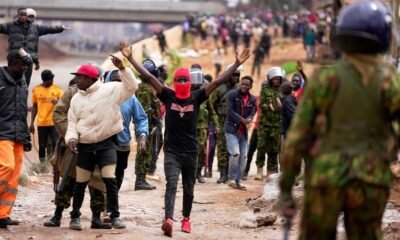
 Africa3 days ago
Africa3 days agoUN Human Rights Office says ‘deeply troubled’ by Kenya protester deaths




